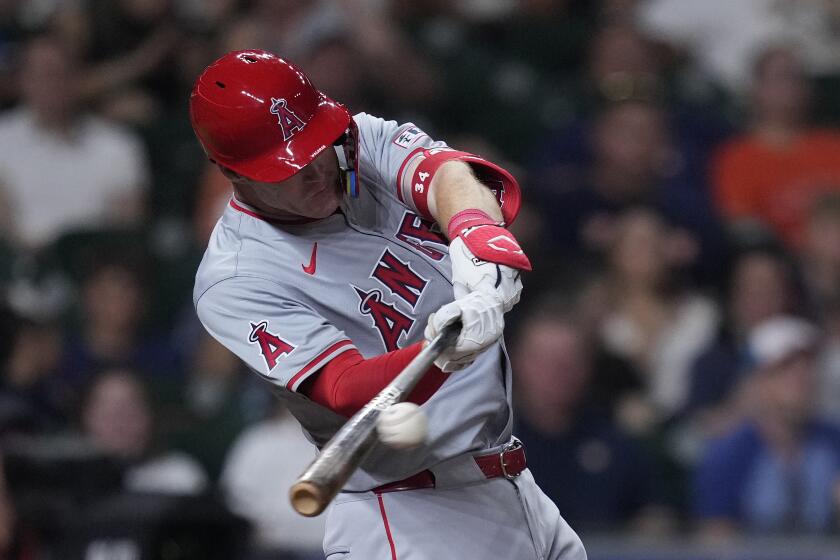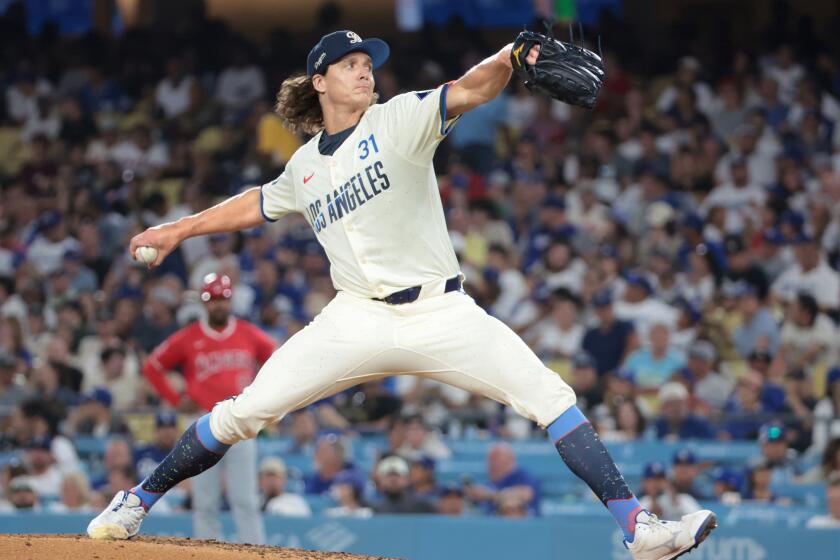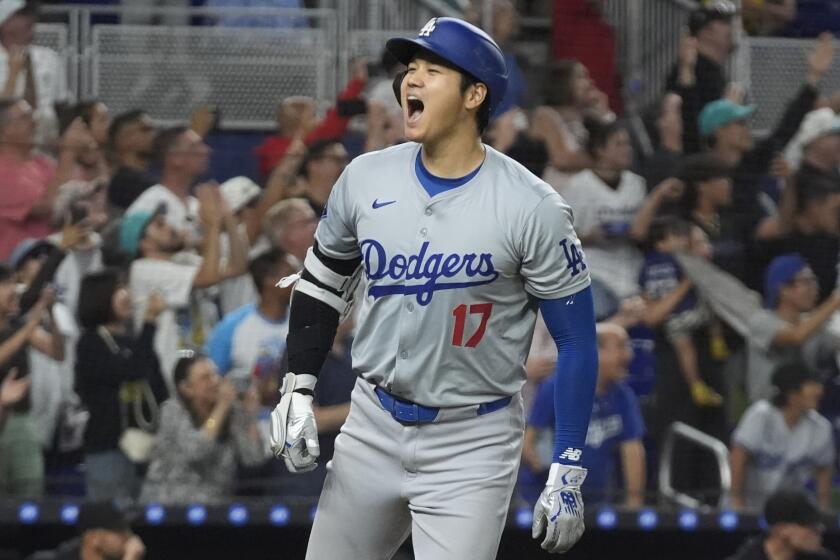CBS shares Final Four
When Final Four action begins Saturday, fans who want to watch the games live online will have to head to CBSSports .com, which owns exclusive online rights to the NCAA men’s basketball tournament.
Or to ESPN.com, SI.com or even Facebook.
This year, for the first time, CBS is allowing hundreds of websites to add a button that, with one click, sends visitors to the streamed games. But fans can move back again, seamlessly, as UCLA graduate student Mike De Land did on Facebook during the early rounds.
“Facebook is sort of becoming everyone’s home page,” De Land said of the social networking site where he and his buddies do a bit of hoops trash talk. “So for them to make it as convenient as possible for people to start at Facebook, where people have their brackets and pools, makes sense. It’s really smart.”
Although CBS declined to say how many fans have so far used the buttons to jump over, the game streamed through last weekend’s games drew 4.3 million unique visitors -- a 147% increase over 2007.
Those visitors have watched 4.6 million hours online so far, which is good news for CBS, which this year has seen an 11% drop in television ratings for the early rounds.
The network blames the drop on blowouts and the absence of some regional fan favorites. But it expects a ratings rebound for Saturday’s Final Four because, for the first time since the brackets were seeded in 1979, all four No. 1s are in: North Carolina, Kansas, UCLA and Memphis.
“You’ve got three programs that are college basketball royalty and a fourth team, Memphis, that has been front and center all year,” said Michael Aresco, senior vice president of programming for CBS Sports. “With teams of this high caliber, all of the games should be very competitive.”
The weak television ratings underscore the assist that big media hopes to get from online advertising.
Online, it’s all about attracting visitors and keeping them for as long as possible. “We had never done anything like this before,” said John Kosner, vice president and general manager of ESPN Digital.
The gambit, however, paid off during early round action when website traffic was up by 20% from last year, Kosner said.
The concept is to capture, share and recapture college basketball fans -- a strategy that could benefit all the participating media companies, not just CBS, which is in the middle of a $6-billion, 11-year media rights deal for March Madness and other NCAA championships.
The men’s tournament traditionally makes for a busy time online because there are too many early round games for CBS to televise buzzer to buzzer and most fans don’t have easy access to televisions at work.
One measure that fans did watch at work during early rounds was that the CBS “boss button” -- which allows office workers to hide the games under an innocuous spreadsheet -- was clicked more than 2.4 million times in the first two rounds.
When CBS first streamed live NCAA tournament action in 2005, it generated $250,000 in subscription fees. The next year CBS switched to a free, advertising-supported business model that generated $4 million. Last year’s tournament revenue hit $10 million. This year, CBS expects online revenue to top $23 million, with most of it falling to the bottom line.
Online is “not a cannibalistic audience” which steals from television ratings, said Jason Kint, senior vice president of CBSSports.com. “It’s clear that online is an at-work audience watching on a computer screen, while the audience during prime time is watching on a flat-screen HDTV. So this is all additional audience for us.”
The increase was driven in part by CBS’ decision to drop online registration and to lift regional blackouts that kept fans from accessing some of the streamed games.
Kint credited fans arriving via Facebook, Sports Illustrated, ESPN and other websites for part of the success: “I don’t think we’d be where we are without the program.”
No money is changing hands in this experiment, but industry observers say sites that installed the buttons probably demanded reciprocal treatment when they have exclusive online content.
The idea of sharing is part of a broader debate over how much to allow sports fans to access game action and highlight footage online.
The NHL, for example, encourages fans to post mash-ups of hockey highlights on a variety of websites. And early next month, the number of game highlight videos viewed on YouTube’s year-old NBA Channel will top 100 million. In contrast, major league baseball and the NFL restrict any online streaming of game-related video to their own websites.
March Madness might prove that it’s impossible to wall off major sporting events.
“The Web is a democracy,” SI.com Managing Editor Paul Fichtenbaum said. “And if we don’t bring the best stuff to our users -- no matter where it happens to land -- then we’re not going to get those users.”
Last year, CBS experimented with a similar concept when its online arm provided a link to PGA.com, which was streaming live action from the PGA Championship and the British Open.
“That’s the job of the online editor in this world,” Kint of CBS said. “You’re the filter for what’s good content online, you’re bringing [fans] diverse points of view and giving your audience the broadest perspective possible.”
CBS, which crowed only about its television ratings among hard-to-reach younger males who dominate the March Madness audience, now is looking to offer advertisers a package of television, radio -- and the Web.
“We’d like to be able to add all of those numbers into one picture for our advertising partners,” Kint said.
“Right now, we can’t do that, except on a platform-by-platform basis.”
ESPN’s Kosner echoed that but added, “We’re still struggling a bit online, but we’re going to come up with something that media buyers will like.”
--
More to Read
Go beyond the scoreboard
Get the latest on L.A.'s teams in the daily Sports Report newsletter.
You may occasionally receive promotional content from the Los Angeles Times.










